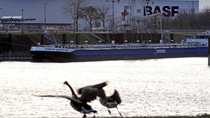Sustainability
Prevention

Safety and Quality Assessment
We continually assess and evaluate our performance on safety and quality using a globally coordinated procedure. Collaboration with our external logistic suppliers is also oriented toward safety. To assess the performance of our carriers, we use our own methods as well as internationally recognized analysis instruments, such as the European Safety and Quality Assessment System (SQAS). This verification system was developed under the leadership of the European Chemical Association (CEFIC) and provides information regarding issues such as the training level of carrier employees, accident response times and equipment carried by vehicles. If we determine that our standards are not being met, these are addressed in quality and safety briefings with the logistic companies and necessary improvement measures introduced immediately.
In other regions, counterparts to the European SQAS with independent assessors have been regularly set up under the patronage of national chemical associations. Examples are "Chemical Road Transportation Safety Assessment System" (CRSAS) which started in 2018 in China and "Sistema de Avaliação de Segurança, Saúde, Meio Ambiente e Qualidade" (SASSMAQ) in Brazil which is in place since 2005. In countries where, such industry shared systems do not exist, BASF introduced by itself similar assessment schemes for checking transportation companies. In Asia haulers must be RSA (Road Safety Assessment) evaluated and approved before they are accepted to be used for transportation of BASF materials. In USA, BASF Corporation is using an external independent company to do this evaluation.

Marine transportation
Safety and quality assessment of marine transportation using tankers is organized on a global scale by the "Chemical Distribution Institute" (CDI). Independent specialists assess ship condition, equipment and operation. As a member of the CDI, BASF evaluates these safety reports and on this basis decides which tankers to use for transporting BASF products. Particular emphasis is placed on crew training and experience, especially in the selection of service providers. Global valid requirements regulate the procedures and interaction of the various BASF units with regard to the uniform assessment of transportation safety of deep-sea tankers.
We added container barges to our existing inspection program in 2016. This includes not only evaluating the vessels themselves, but also the management systems of the shipping companies to review their safety standards.
Safety through prevention
We broadened the training opportunities for our employees and added new e-learning modules, such as the introduction of a multilingual training module in Europe on the road transportation of dangerous goods.
We regularly evaluate the risks in transporting raw materials with high hazard potential using our global requirements. This is based on the guideline of the European Chemical Industry Council CEFIC.